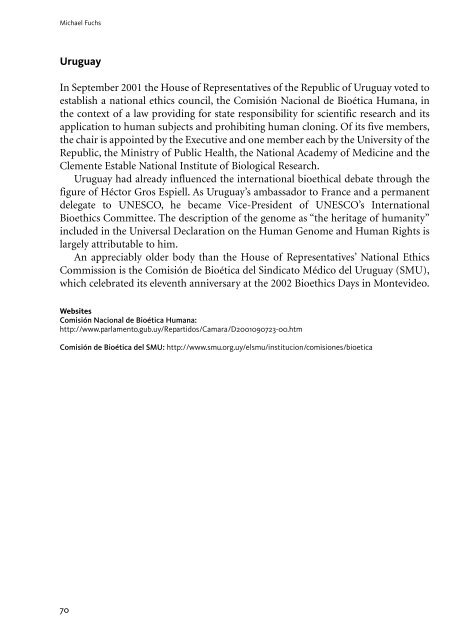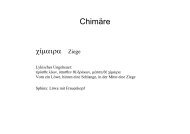Michael Fuchs National ethics councils - Deutscher Ethikrat
Michael Fuchs National ethics councils - Deutscher Ethikrat
Michael Fuchs National ethics councils - Deutscher Ethikrat
Create successful ePaper yourself
Turn your PDF publications into a flip-book with our unique Google optimized e-Paper software.
<strong>Michael</strong> <strong>Fuchs</strong> <strong>National</strong> <strong>ethics</strong> <strong>councils</strong>. Their backgrounds, functions and modes of operation compared<br />
Uruguay<br />
In September 2001 the House of Representatives of the Republic of Uruguay voted to<br />
establish a national <strong>ethics</strong> council, the Comisión Nacional de Bioética Humana, in<br />
the context of a law providing for state responsibility for scientific research and its<br />
application to human subjects and prohibiting human cloning. Of its five members,<br />
the chair is appointed by the Executive and one member each by the University of the<br />
Republic, the Ministry of Public Health, the <strong>National</strong> Academy of Medicine and the<br />
Clemente Estable <strong>National</strong> Institute of Biological Research.<br />
Uruguay had already influenced the international bioethical debate through the<br />
figure of Héctor Gros Espiell. As Uruguay’s ambassador to France and a permanent<br />
delegate to UNESCO, he became Vice-President of UNESCO’s International<br />
Bio<strong>ethics</strong> Committee. The description of the genome as “the heritage of humanity”<br />
included in the Universal Declaration on the Human Genome and Human Rights is<br />
largely attributable to him.<br />
An appreciably older body than the House of Representatives’ <strong>National</strong> Ethics<br />
Commission is the Comisión de Bioética del Sindicato Médico del Uruguay (SMU),<br />
which celebrated its eleventh anniversary at the 2002 Bio<strong>ethics</strong> Days in Montevideo.<br />
Websites<br />
Comisión Nacional de Bioética Humana:<br />
http://www.parlamento.gub.uy/Repartidos/Camara/D2001090723-00.htm<br />
Comisión de Bioética del SMU: http://www.smu.org.uy/elsmu/institucion/comisiones/bioetica<br />
70<br />
IV. Middle East and north Africa<br />
Israel<br />
A discussion on bioethical issues in the development and application of new technologies<br />
has been under way in Israel for many years, involving not only the predominant<br />
international topics and approaches but also the expression and<br />
interpretation of rabbinical tradition. However, it is only in the last few years that attempts<br />
have been made, in the framework of the Israel Academy of Sciences and Humanities,<br />
to gather representatives of the majority of interpretations and schools<br />
around a single table in a permanent body. The Bio<strong>ethics</strong> Advisory Committee of the<br />
Israel Academy of Sciences and Humanities has since published two important Opinions.<br />
August 2001 saw the publication of the report The Use of Embryonic Stem Cells<br />
for Therapeutic Research, which adopts an approach related to the present British position<br />
and also discusses therapeutic cloning. This was followed in December 2002 by<br />
another report, on biobanks Population-Based Large-Scale Collections of DNA Samples<br />
and Databases of Genetic Information.<br />
The Committee’s members are representatives of the judicial authorities and the<br />
judiciary, academic lawyers, geneticists, philosophers and biochemists; there is one<br />
representative of the Ministry of Health.<br />
The activity of the 12-member Committee is based on the general provisions on<br />
the functions and structure of the Academy laid down by the Law of 1961, according<br />
to which it is required not only to promote science and international scientific exchanges,<br />
but also to advise the Government within its field of competence.<br />
Website<br />
Israel Academy of Sciences and Humanities: http://www.academy.ac.il<br />
Bibliography<br />
Israel Academy of Sciences and Humanities (2001). The Use of Embryonic Stem Cells for Therapeutic Research.<br />
Available online at: http://www.academy.ac.il/bio<strong>ethics</strong>/english/report1/Report1-e.html<br />
Israel Academy of Sciences and Humanities (2002). Population-Based Large-Scale Collections of DNA Samples<br />
and Databases of Genetic Information.<br />
Available online at: http://www.academy.ac.il/bio<strong>ethics</strong>/english/report2/Report2-e.html<br />
71




